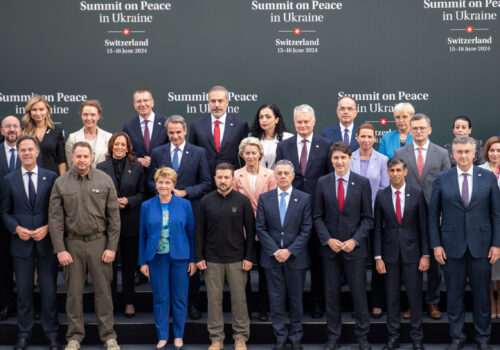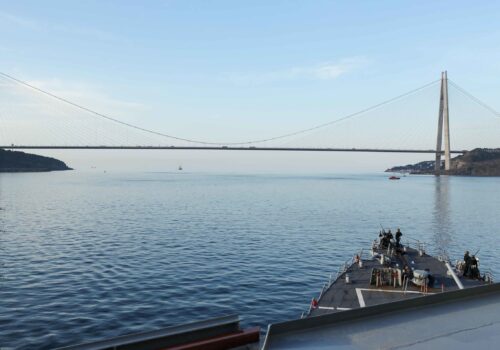A sea of opportunities: Introduction
This is part of an report on the prospects for enhanced cooperation between Turkey and Western countries in the Black Sea region in the new geopolitical setting following Russia’s full-scale invasion of Ukraine.
This report draws on the findings of a research project titled “A sea of opportunities: Can the West benefit from Turkey’s autonomous foreign policy in the Black Sea?”1For more details on the project see https://www.cats-network.eu/projects/ongoing-projects/a-sea-of-opportunities-can-the-west-benefit-from-turkeys-autonomous-foreign-policy-in-the-black-sea, a joint initiative of the Atlantic Council in Turkey and the Centre for Applied Turkey Studies (CATS). Through a series of interviews with experts and policymakers, as well as desktop research, the authors explore opportunities for enhanced cooperation between Turkey, European countries, and the United States in the new security environment that has emerged in the Black Sea region following Russia’s full-scale invasion of Ukraine in 2022. In this report, the Black Sea region refers to the six littoral states and the South Caucasus (i.e., Armenia, Azerbaijan, and Georgia).
As the second-largest military power in NATO and the gatekeeper of the Black Sea, Turkey plays a critical role in European stability and security. Since the first days of Russia’s all-out war in Ukraine, the Turkish government has kept the Straits of Bosporus and Dardanelles closed to Russian warships, expanded defense and military cooperation with Kyiv, and later engaged in active diplomacy, including facilitating the Black Sea Grain Initiative and prisoner swaps. Turkey has remained steadfast in its political support for Ukraine’s sovereignty and territorial integrity, and has consistently refused to recognize Russia’s illegal occupation and annexation of Ukrainian territories. Ankara has also developed close cooperation with the two other NATO members located along the Black Sea—Romania and Bulgaria—and has been vocal in its support for Ukraine’s and Georgia’s NATO membership bids.
On the other hand, Ankara has not joined Western sanctions against Russia, has opposed NATO’s enhanced naval presence in the Black Sea, and has continued cooperation with Russia on a range of issues, most notably energy projects and bilateral trade. At the same time, Turkey’s own security sensitivities and threat perceptions, which differ significantly from those of other NATO allies, have over time cemented Ankara’s traditional “regional ownership” approach, which focuses on Turkey’s own national interests in the region and limits opportunities for cooperation with other extra-regional actors in the Black Sea region.2Regional ownership calls for addressing the challenges and crises in the region through dialogue and cooperation among littoral states, without the involvement of non-regional actors. The Montreux Convention serves as a legal framework to control the access to the Black Sea for the navies of non-littoral states, as well as their duration of stay.
While the end state of Russia’s war in Ukraine is difficult to predict, there is no doubt that Turkey will remain a key actor in the postwar regional security environment. This study not only examines both Turkey’s Black Sea policy priorities and the potential role of Western countries in that region, but also explores the possibilities for closer cooperation between Turkey and its Western allies in this new security setting.
Notably, Turkey views strict adherence to the Montreux Convention as a cornerstone of its regional policy and even of its state sovereignty. Yet there are still many areas of overlapping interests that could allow for enhanced cooperation with the West without violating Turkey’s traditional principle of regional ownership. In line with NATO policy, Turkey’s strategic objectives in the Black Sea include deterring, without openly challenging, Russia’s military and naval presence; ensuring that Ukraine does not fail and that its southern regions are not fully occupied by Russia, which would turn the Black Sea into a “Russian lake”; and strengthening Ankara’s defense industry, naval capabilities, and diplomatic clout in the region.
Turkey sees Ukraine as a natural ally as both countries seek to counter Russian superiority in the Black Sea. Despite maintaining strong economic ties with Moscow, Ankara attaches strategic importance to its relationship with Kyiv, which it regards as a counterweight to Russia, a key element in Ankara’s delicate balancing act with the West and Russia, and an important partner in defense production. Backed by Western allies, this emerging strategic connection could become a backbone of the future security architecture in the region and also strengthen Turkey’s ties with the West.
Now that Ukraine has humbled Russia’s navy in the Black Sea, Turkey’s maritime capacity there stands out all the more. Ankara is using this moment to develop closer defense cooperation with Ukraine, the United States, and other NATO allies. Elements of that cooperation can be seen in progress on the F-16 deal, Sweden and Finland joining NATO, and cooperation between Washington and Ankara on military production.
Positive dynamics in the broader context of Turkey’s dialogue with the United States and European partners have created momentum for exploring new cooperation opportunities in the Black Sea. While the region remains sensitive to fluctuations in Ankara’s relations with its Western partners, these developments also create a window of opportunity for improving relations, and could emerge as a much-needed success story in the transatlantic partnership. Turkey is also seen as an increasingly important actor in the European energy market, both as a transit country and as a potential new supplier of hydrocarbons with the potential to contribute to Europe’s energy resilience.
Recognizing the importance of closer cooperation between Turkey, Ukraine, and Western partners for both regional security and Turkey’s own democratic future, this report provides an in-depth analysis of key areas of common interest in the Black Sea region: deepening political and diplomatic dialogue; strengthening defense and military cooperation; ensuring freedom of navigation and maritime security; and promoting energy diversification.
Continue on to the next chapter of the report: “Part 1. Political and diplomatic dialogue: Challenges and opportunities for Black Sea cooperation between Turkey and the West in the post-2022 environment.”
About the author
Yevgeniya Gaber is a nonresident senior fellow at the Atlantic Council IN TURKEY and a professor at the George C. Marshall European Center for Security Studies. Follow her on X, formerly known as Twitter, at @GaberYevgeniya.
Further reading

The Atlantic Council in Turkey aims to promote and strengthen transatlantic engagement with the region by providing a high-level forum and pursuing programming to address the most important issues on energy, economics, security, and defense.
Image: The Danube spills into the Black Sea (The Sea WiFS Project/NASA Earth Observatory/Wikimedia Commons).



Follow the conversation on X, formerly known as Twitter, with @AC_TRprograms and @AtlanticCouncil using #ACTurkey